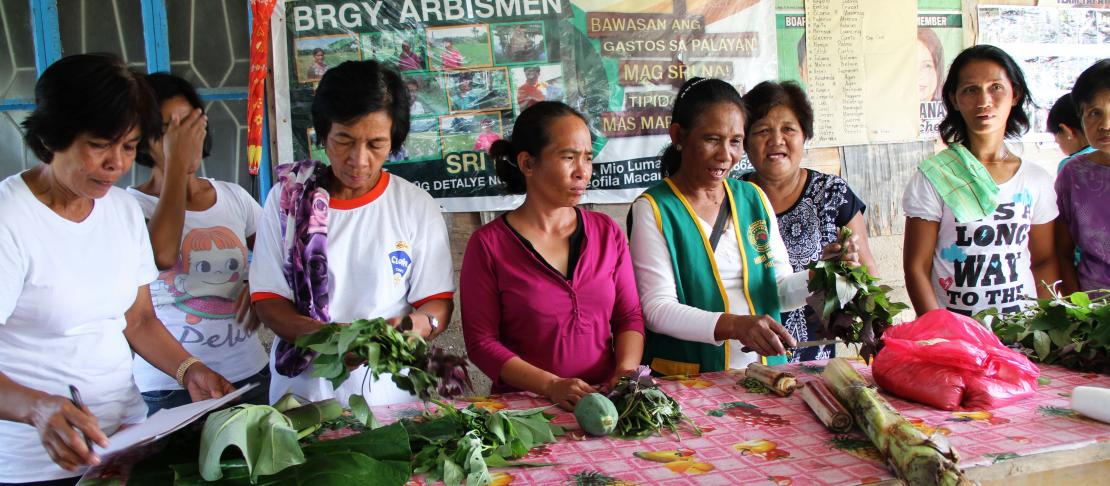Philippine media conclude climate change workshops

Engaging and training media on climate discussions is crucial in disseminating science-based information on climate change issues more broadly and visibly.
A series of seminar workshops were conducted across the Philippines mainly to train media practitioners on climate change reporting and to encourage them to feature important climate-related news in their respective agencies more frequently.
On March 4-5, 2016, the fourth and final leg of the media workshops was held in Tuguegarao City, northern Philippines with 115 media practitioners and government information officers in attendance. Participants came from the provinces of Cagayan, Isabela, Nueva Vizcaya and Quirino— areas where strong typhoons and droughts frequently affect agricultural production.
The activity was co-sponsored by the Manuel V. Pangilinan Group of Companies, a private conglomerate, and the Department of Agriculture (DA) Cagayan Valley regional office, headed by Director Lucrecio Alviar, Jr.
Dir. Alviar discussed the DA’s initiatives to enable Cagayan Valley farmers and the agriculture sector better adapt to the adverse effects of climate change and be more resilient.
“The Cagayan Valley region is 280% sufficient in rice and remains to be the country’s top corn producer and the main source of hybrid goat and sheep,” said Dir. Alviar. Thus, it is more important to seriously address climate change problems. He also said that DA targets to make the region a major basket of tropical fruits and vegetables in North Luzon.
Unable to make it to the event, the DA Secretary Proceso Alcala conveyed his message through Dir. Alviar, saying that climate change is inevitable. To help farmers and fishers, the DA implements adaptive measures by improving infrastructures and providing livelihood projects to improve farmers’ adaptive capacities to continue producing agricultural products and increase their incomes amid climate change.
“Through the help of the media, I hope that more information will be shared with the agriculture sector,” the DA chief said.
The media practitioners listened to scientists discuss various climate-related topics and colleagues in the industry talked about climate change reporting. There was ample time for lengthier discussions during the marketplaces where each of the scientists addressed with a small group of participants.
To enhance learning, participants went on a field tour to visit climate-resilient farms or agricultural projects and interview farmers. In Tuguegarao, the participants visited a farmers’ field school and the farm of Juana Guitering, a national rice farmer awardee, in Peñablanca, Cagayan.

Participants of the fourth and last leg of media workshops conducted in the Philippines. Photo: PAJ
Aptly titled “Climate Change: Gets mo na ba?” (Climate Change: Do you get it?), around 500 broadcast journalists from print, radio and TV had benefited from the series of training workshops organized by the Philippine Agriculture Journalists, Inc. (PAJ), in partnership with the Manuel Pangilinan Group of Companies, a private conglomerate, Department of Agriculture (DA), Philippine Science Journalists, Inc. (PSciJourn), Philippine Federation of Rural Broadcasters (PFRB), and the Philippine Network of Environmental Journalists (PNEJ).
The series of media workshops in the Philippines was an offshoot of the regional media workshops conducted jointly by the CGIAR Research Program on Climate Change, Agriculture and Food Security (CCAFS) and other CG Centres in the Philippines, Vietnam, Lao PDR and Cambodia. PAJ, PSciJourn, PFRB, and the PNEJ actively participated in the Philippine leg, which is how the idea to conduct the same activities in different provinces of the country took form.
Future activities point to the development of online platforms where journalists can find a wide array of information on climate change issues, and climate-smart practices and technologies.
Read more:
- IRRI blog: CCAFS-SEA kicks off first media workshop on how to report about climate change with impact
- Laotian media professionals trained in climate change
- Sharing climate change science with Philippine provincial media
- Tune in: Philippine rural broadcasters to promote climate-smart agriculture
- Philippine student journalists primed for climate change reporting
Noel Reyes is the Vice President of the Philippine Agricultural Journalists.



